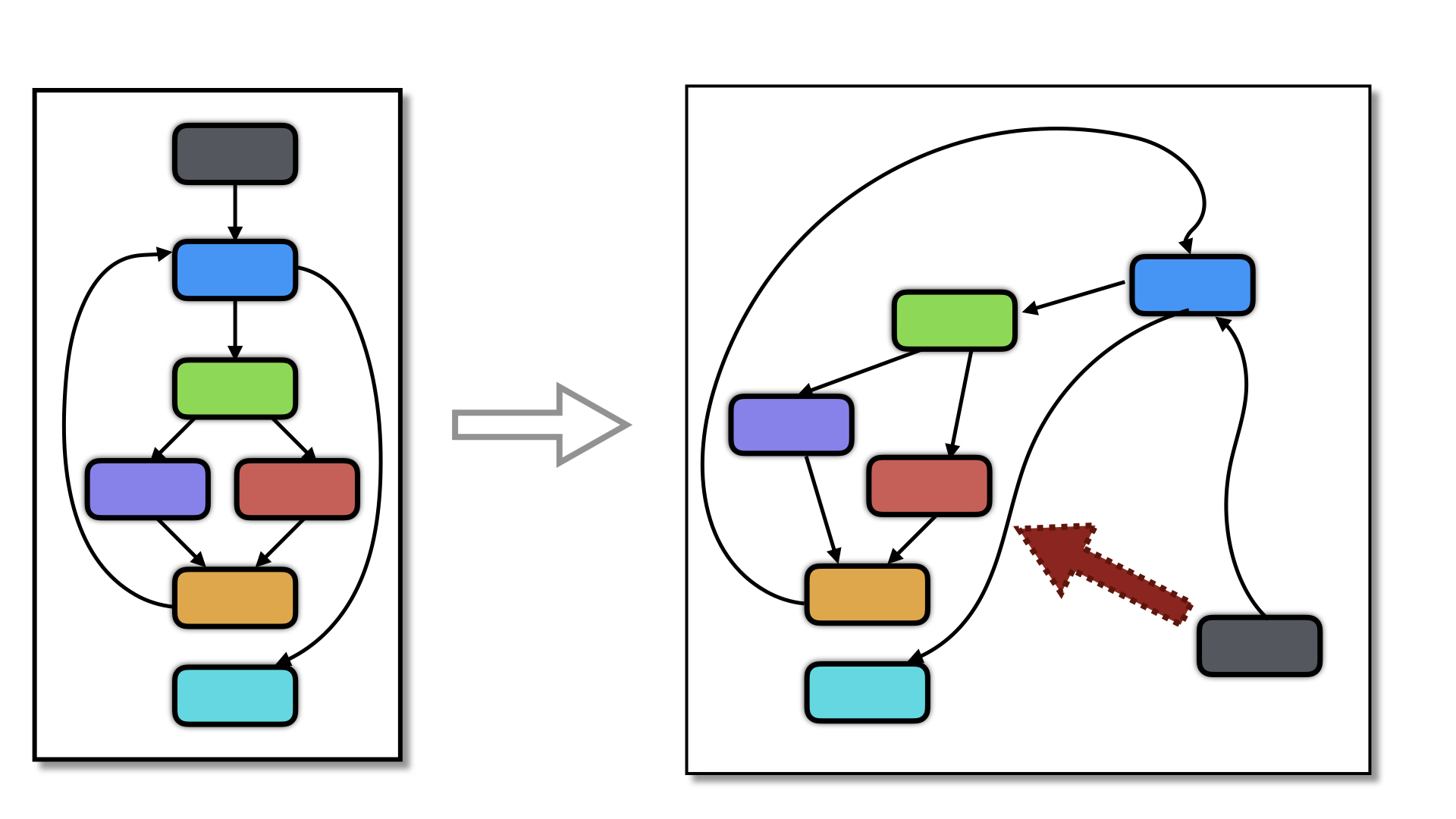

The goal of these transformations is to make functions self-modifying. Here's how Tigress is invoked:
> tigress --Environment=x86_64:Darwin:Clang:5.1 \
--Transform=Virtualize\
--Functions=add \
--VirtualizeDispatch=direct \
--Transform=SelfModify \
--Functions=add \
--SelfModifyFraction=%100 \
--SelfModifySubExpressions=false \
--SelfModifyOperators=\* \
--SelfModifyKinds=\* \
--SelfModifyBogusInstructions=0 \
inc.c --out=obf.c
> gcc -segprot __TEXT rwx rwx obf.c -o obf.exe # Darwin (early versions)
> tigress_post --Action=writable obf.exe # Darwin (newer versions)
> gcc --static -Wl,--omagic obf.c -o obf.exe # Linux
The transformation inserts a binary code template at the top of the function. There's one template for each type (int/long) and one for arithmetic, one for comparisons, and one for branches. They look roughly like this:
addrPtr10 = (unsigned long *)((unsigned long )(&& Lab_1) + 5);
*addrPtr10 = (unsigned long )(& A);
addrPtr10 = (unsigned long *)((unsigned long )(&& Lab_1) + 18);
*addrPtr10 = (unsigned long )(& B);
addrPtr10 = (unsigned long *)((unsigned long )(&& Lab_1) + 41);
*addrPtr10 = (unsigned long )(& C);
addrPtr10 = (unsigned long *)((unsigned long )(&& Lab_1) + 61);
*addrPtr10 = (unsigned long )(&& Lab_2);
Lab_1:
__asm__ volatile (
".byte 0x50;\n" // push %eax/rax
".byte 0x51;\n" // push %ecx/rcx
".byte 0x56;\n" // push %rsi/esi
".byte 0x48, 0xb8,0xc,0x7b,0x21,0x3d,0x54,0x2d,0xc0,0x1;\n" //movabs &A,%rax
".byte 0x8b, 0x00;\n" // movl (%rax),%eax
".byte 0x48, 0xb9,0x4f,0x40,0x2f,0xa3,0xd0,0xdc,0x24,0x42;\n" //movabs &B,%rcx
".byte 0x8b, 0x09;\n" // (%rcx),%ecx
".byte 0x31, 0xf6;\n" // xorl %rsi,%rsi
".byte 0x39, 0xc8;\n" // cmpl %rcx, %rax
".byte 0x40, 0x0f, 0x9c, 0xc6;\n" // setl %sil
".byte 0x48, 0xb9,0x7f,0x91,0x1c,0xaf,0xab,0x5f,0x2d,0x6a;\n" // movabs &C,%rcx
".byte 0x67, 0x89, 0x31;\n" // movl %esi,(%rcx)
".byte 0x5e;\n" // popq %rsi/esi
".byte 0x59;\n" // popq %ecx/rcx
".byte 0x58;\n" // popq %eax/rax
".byte 0xff, 0x25, 00, 00, 00, 00, 0xba,0xee,0x19,0x51,0x13,0x4b,0x12,0xdb;\n" // jmp (%rip)
:);
Lab_2:
Then, for each binary operation in the remainder of the function, the following code is inserted:
A = i;
B = n;
addrPtr10 = (unsigned long *)((unsigned long )(&& Lab_3) + 6);
*addrPtr10 = (unsigned long )(&& Lab_1);
addrPtr10 = (unsigned long *)((unsigned long )(&& Lab_1) + 61);
*addrPtr10 = (unsigned long )(&& Lab_4);
opPtr11 = (int *)((unsigned long )(&& Lab_1) + 35);
*opPtr11 = 0xc69c0f40L; // setl %sil
Lab_3:
__asm__ volatile (
".byte 0xff, 0x25, 00, 00, 00, 00, 0x3b,0x21,0x2e,0xd7,0xc5,0x44,0xf0,0xdd;\n" //jmp (%rip)
:);
Lab_4:
At runtime, this makes the following changes to the executable code:
setl in this case),
Lab_1),
Lab_4).
This transformation is particularly useful after transformations that introduce indirect branches, such as virtualization and flattening with a direct or indirect dispatch. Below is an example:
void add(void) {
...
//----------------- Instruction Handler ----------------------
Lab_1: _1_add__load_int$left_STA_0$result_STA_0:
(_1_add_$pc[0]) ++;
(_1_add_$sp[0] + 0)->_int = *((int *)(_1_add_$sp[0] + 0)->_void_star);
// BEGIN indirect branch to the next instruction starts here
branchAddr10 = (unsigned long *)((unsigned long )(&& Lab_3) + 6);
*branchAddr10 = *(_1_add_$pc[0]);
Lab_3: /* CIL Label */
__asm__ volatile (".byte 0xff, 0x25, 00, 00, 00, 00, 00, 00, 00, 00, 00, 00, 00, 00":);
// END
//----------------- Instruction Handler ----------------------
_1_add__returnVoid$:
(_1_add_$pc[0]) ++;
return;
...
}
Here, each indirect branch turns into the following code, where the byte sequence corresponds to the X86 8-byte direct jump:
addr = (unsigned long *)((unsigned long )(&& Lab) + 6);
*addr = address-to-jump-to;
Lab: asm volatile(".byte 0xff, 0x25, 00, 00, 00, 00, 00, 00, 00, 00, 00, 00, 00, 00":);
This is interesting, since some de-virtualization transformations look for indirect branches, and these are now gone from the code.
For this transformation we generate copious amounts of inline assembly code. Different compilers
support various forms of inline assembly. Clang didn't support asm goto until recent versions,
for example, and MSVC doesn't support any of the gcc extensions we rely on. Furthermore, the actual
syntax and semantics the compilers implement can vary. For example, Clang accepts asm volatile goto
but not asm goto volatile (gcc accepts either).
Tigress supports a few different "styles" of inline assembly to generate for this transformation.
We try to pick the right style based on your plaform (remember to set the --Environment= option
correctly!!!), but you can use the --SelfModifyStyle option yourself if your compiler misbehaves and
you want to experiment.
| Option | Arguments | Description |
|---|---|---|
| --Transform | SelfModify | Transform the function by adding code that modifies itself. |
| --SelfModifyKinds | indirectBranch, arithmetic, comparisons | Types of instructions to self-modify. Default=indirectBranch.
|
| --SelfModifyStyle | clobber, stack, text | What style of inline assembly code to generate. Default=NONE.
|
| --SelfModifyFraction | FRACSPEC | How many statements should be self-modified. Default=%100. |
| --SelfModifySubExpressions | BOOLSPEC | Recurse into sub-expressions with transforming an expression. Can cause bugs. Default=false. |
| --SelfModifyBogusInstructions | INTSPEC | How many bogus instructions to insert inside the self-modify template to avoid pattern-matching attacks. Right now, the inserted instructions are simple 1-byte x86 instructions that are equivalent to NOPs. Default=0. |
--SelfModifyBogusInstructions=0?5. This inserts between 0 and 5 NOP-equivalent bytes
between the template instructions.
gcc. In that case, switch to clang.